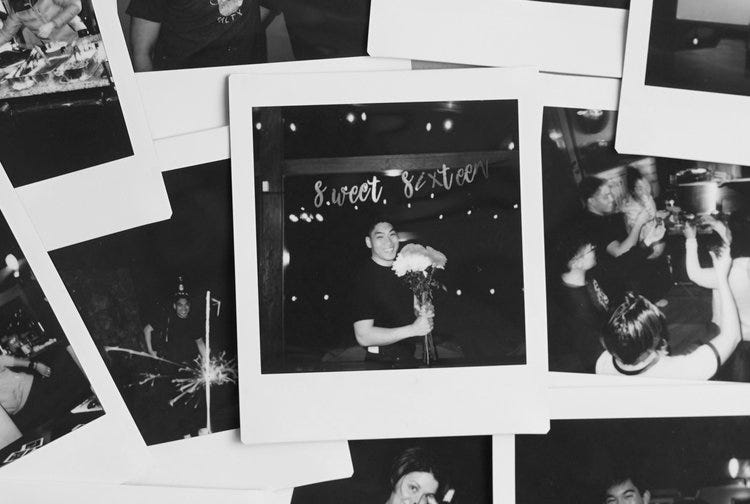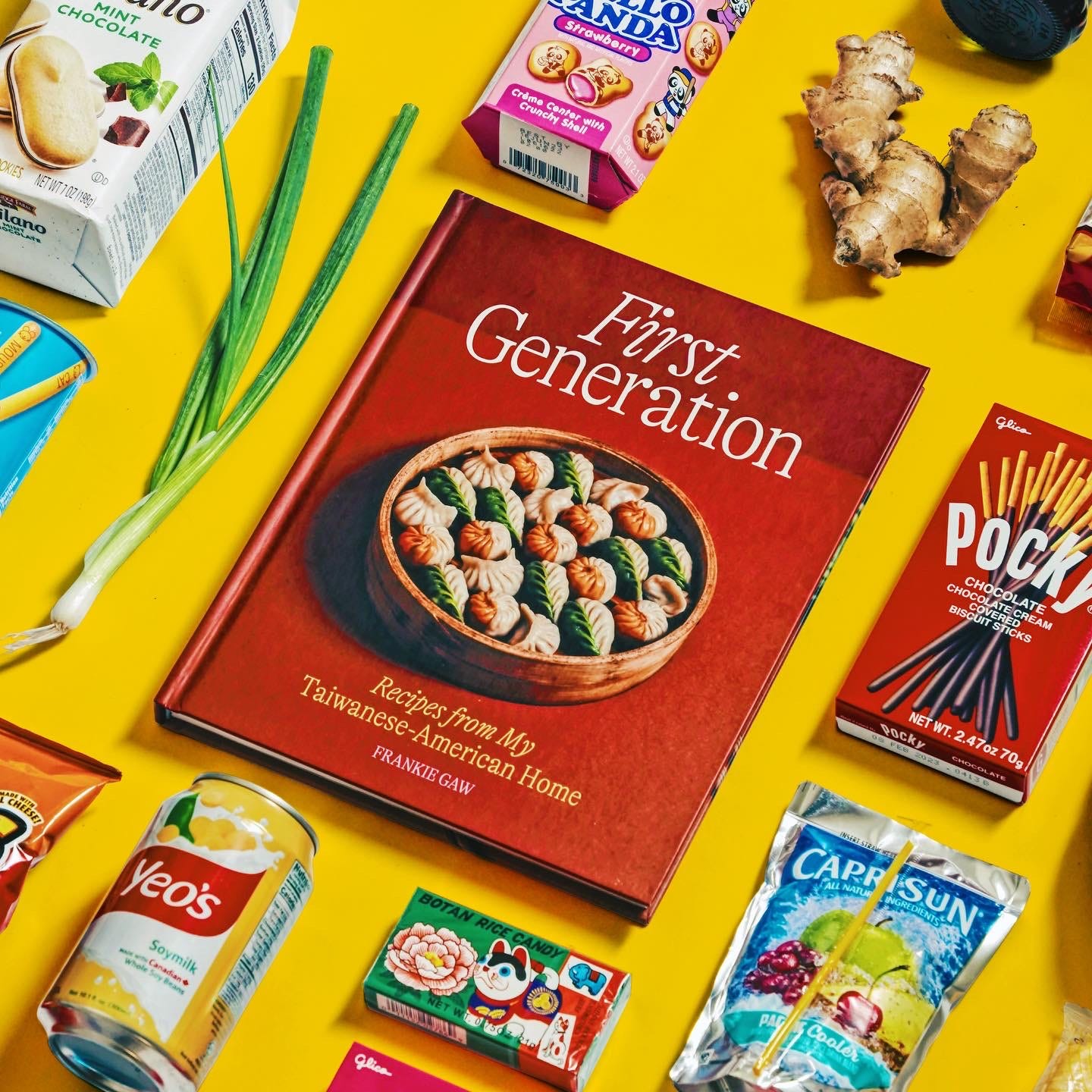Frankie Gaw is taking his designs to a cookbook
Issue 46: On how he landed and wrote his first cookbook, First Generation.
Why hello there! Welcome to on hand! If you’ve landed here and somehow aren’t subscribed, I got you:
Frankie Gaw is a designer-turned-cookbook writer who launched Little Fat Boy a few years ago as a project to learn more about the Taiwanese recipes he grew up eating, and making them his own. Since its launch, he’s won awards, quit his full time job, and has a cookbook, First Generation, coming out this month.
I spoke to Frankie in early 2020, which feels like one thousand lifetimes ago. He and I caught up recently to chat about his book deal, his process, and some of the inspiration for the book.
His cookbook comes out October 25th. I’ve pre-ordered it and I can’t wait for its arrival. You can learn more about his book and pre-order here and catch him when he goes on tour.
Brianna Plaza: Can you tell me what's happened in the last couple of years since we spoke? How did the cookbook come about? Did you pitch? Walk me through that process.
Frankie Gaw: Since we spoke in early 2020, that was the year everything jump-started for me. I was still, at that point, working at Airbnb. I was still doing design work but my Instagram was just more of a passion project for me.
I had just gotten the Saveur award. So it was starting to percolate in terms of people outside of my friend group being interested in the stuff that I was doing. I was doing a lot of experimenting with dumplings and still trying out Taiwanese American food.
The pandemic for me allowed me to cook so much more. So the content I was producing was just way more than I was doing when I was going to the office every day. I think my blog and my account continued to grow at that point much more than before. It was this weird, perfect storm of just a lot of things coming together. And then it just grew into its own thing. And so by around March or April of 2020, my now-agent reached out to me over Instagram.
She was seeing all the stuff that I was making and she was, "Hey, have you ever thought about writing a cookbook?" And at that point I had actually been reached out to in the past about writing cookbooks, but directly from publishers. And at the time I knew I wasn't ready. So I had declined the offers that I got, but it did plant the seed of, oh, a cookbook would be really cool one day, but I'd want to do it when I was ready — when I had more of a vision of what I wanted to say. So by the time that she had messaged me in March, 2020, I had already been thinking about it for a bit. The timing was kind of right — “Oh yeah, I am thinking about it. And I'm interested in it."
She guided me through the whole process. So she was like, “Okay, if you want to write a cookbook, you need a book proposal.” The way it works is you put together almost like a portfolio or an interview packet where you're having to list out all your recipes. What are the different books out there that are your book? I just went through that whole process with her and eventually she signed me. She pitched to a bunch of different publishers and then that's how I landed with 10 Speed.
From there, I started working on the book. So all of 2021 I basically wrote, cooked, built recipes, and shot photography for the book. And we wrapped up the book around December 2021. And now we're spinning up some of the marketing promotions and starting to think about events.
Brianna Plaza: Is there a reason behind you shooting your own photography?
Frankie Gaw: I mean, you definitely save money obviously, but, I think for me it was more of just wanting to be able to visually tell my own story. I think I just wanted to prove to myself that I could shoot these photos and also — I just wanted to. I think I've always had this dream of representing a lot of this home style food in the same way that I feel like a lot of Western dishes have always been represented. I just thought how cool would it be to shoot these photos and bring it to that same level as the way Western food is typically shot. So to me it felt like an opportunity to see the representation that I always wanted to see and know that I had the skill set to do it.
It wasn't really about making it look fancy. It was more just being able to represent the food in a way that was creative or visually saying something. Even with the photography, I was definitely conscious of my Instagram style and I wanted to push myself and try something new. And so a lot of the photographs reference a lot of old vintage Chinese cookbook photography. A lot of the general visual aesthetic pays homage to the vintage cookbooks that I grew up looking at.
I'm not sure if I would've been able to put in the same details if I had hired someone to do it for me. But, it was a lot, I don't know if I would do it again.
Brianna Plaza: How did you decide on that format of the book with essays and recipes as opposed to anything else?
Frankie Gaw: I think I knew I wanted to write essays, so naturally it just felt right to start each chapter with an essay. So that's how it split. Each chapter has an opener and I knew I didn't want to do a standard, "Oh this is the Appetizer Chapter. And these are all the appetizers." I think in my head when I first started writing the book, that's how I thought I was going to write it. I was just going to describe everything in visual detail and explain the foods themselves. But a lot of my friends when they were reading the recipe notes or reading the descriptions, they were like, "Oh, this doesn't sound like you at all. It's describing the food, but I don't know anything about you still."
So I thought, "Okay, maybe I do need to be a little bit more vulnerable and actually talk about where this food comes from and what it means to me personally." And it might be a very individualistic point of view, but I wanted to at least share that and maybe hope that someone else could relate to it as well. So then that's when I decided to write the essays and pair them and take it from there.
Brianna Plaza: Did you have a lot of recipes in mind on the back burner you could use? Or did you completely start from scratch?
Frankie Gaw: There are definitely some recipes that I've done before that I wanted to put in the book. A lot of classic recipes I grew up with like pork dumplings and scallion pancakes. These are things that I've posted about before, but are representative of my history and my story. So I was like I have to put these in there. And there are a few other recipes that I brought in that I had already developed, but I'd say the majority of them were developed for the book specifically as I was writing it.
Brianna Plaza: You already have a very design-forward style. How did you pick a different route that you wanted to go to?
Frankie Gaw: I think it all started with the title and the overall theme of the book. I knew I wanted to call it First Generation. That was literally the title from the very beginning. I knew I wanted to reference my grandparents and their story and talk about the overall Asian-American immigrant experience. That was the overarching theme that ties everything together. I knew that because that was the theme, I wanted to represent that by referencing past things like old cookbooks or old graphic design from the 70s or the 80s from Taiwanese packaging or books. I knew I wanted it to be referential in the design because the theme was around generational stories and how it affects me and my story relative to my parents and my grandparents. And so to me it felt right to reference those things from the past and make it feel almost like vintage or something that's been around. So, that's how the aesthetic came about.
Brianna Plaza: When we first talked, we were in this, "stay at home and cook world". Then we shifted to normal-ish. Now we're in this, "I should stay home and save money world". How have all of those things informed how you wrote the book?
Frankie Gaw: I mean, I would say when we were in the stay at home phase, I think it did subconsciously affect a lot of the recipes that I was developing. For me, I think a lot of it was around comfort. I wanted to bring a sense of comfort through food. And a lot of the recipes were not overly complicated, I would say. It was definitely more of, how can I make food that I can just enjoy for myself at home that brings me comfort? What brings nostalgia? Because I think that was very much my head space when I was in lockdown and also developing for this book at the same time. That phase informed a lot of the recipe development.
It's interesting because, even now, I feel like I'm still in the planning stages. So I haven't really figured out what the right approach is in terms of how to go about events, but it definitely feels like it's almost a hybrid model of being able to do both virtual events, but also be able to do things in the physical world. For me, this whole process has been so … virtual in a sense. Everything I've been doing, even when I was talking to you, it was always through my phone mostly. All my interactions through my phone, everything was through a digital screen.
This whole process has been just so insular and very inward. So I think there's a part of me that as we're opening up and that we're starting to figure out events selfishly, I'm like, "Oh, it'd be so cool to meet people and to see other people who also love food and have similar stories to me," and have that interaction.








